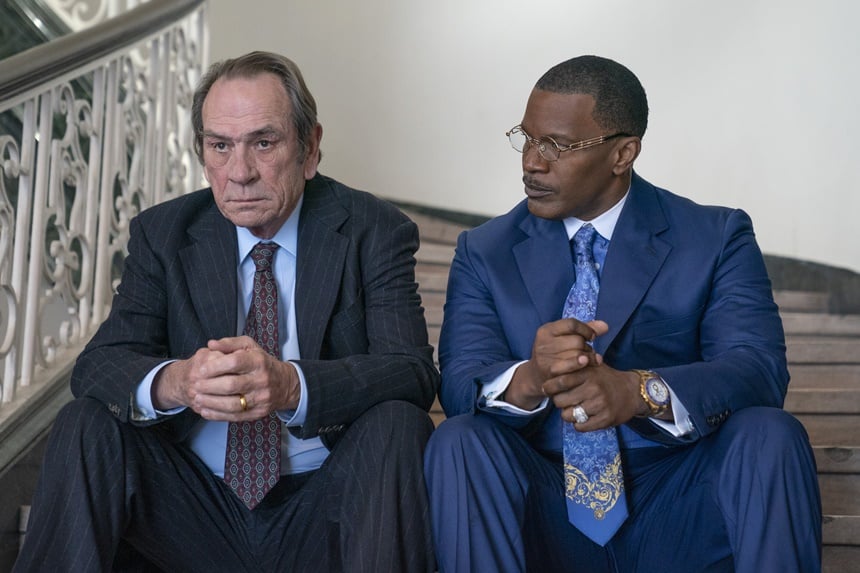The Burial
⭐️ ⭐️ ⭐️ ⭐️
Run Time: 2 hours 6 minutes
Stars: Tommy Lee Jones, Jamie Foxx
Writers: Maggie Betts, Doug Wright, Jonathan Harr
Director: Maggie Betts
In theaters and streaming on Amazon Prime
Reviewed at the Toronto International Film Festival
Nobody plays the hangdog man of principle better than Tommy Lee Jones, and nobody plays the street-smart-but-vulnerable huckster better than Jamie Foxx — and that, your honor, is my summation in favor of The Burial, an eminently watchable, stubbornly traditional courtroom drama.
The Burial is loosely based on a real trial, one that drew a minute or two of national notice back in 1995 when Jeremiah O’Keefe, a small-town Mississippi funeral home owner, sued the Loewen Group, a national mortuary network, charging that it had fraudulently agreed to buy a pair of underperforming parlors from him when it was really planning to drive him out of business.
Jones’s Jeremiah is a drawling, decent old fella who just wants to hold onto his struggling business long enough to leave something to his kids and numerous grandchildren. (He may also want to consider leaving a bequest to his wild, grizzly eyebrows, which seem to have lives of their own, curling and flexing across his forever-furrowed brow.)
Accompanied by his southern gentleman lawyer and lifelong friend (Alan Ruck), Jeremiah flies to Canada to discuss a possible sale with a mortuary mogul (Bill Camp, at his growling best), whom we hate immediately because he lives on a yacht, and not in a family portrait-strewn farmhouse like Jeremiah does.
Despite some misgivings, Jeremiah and the mogul make a handshake deal, which to Jeremiah is as binding as a blood oath and to the mogul is worth less than the ice melting in his whiskey glass. As months go by and the mogul never consummates the agreement, it begins to dawn on Jeremiah that the millionaire is simply waiting for the business to fail so he can pick it up for pennies on the dollar.
Jeremiah instructs his lawyer to sue, but then throws his old friend a curve: As co-counsel he wants to hire one Willie E. Gary, a notoriously flashy slip-and-fall personal injury lawyer whose garish late-night TV commercials have caught his eye.
And so begins the odd couple relationship that is at the heart of The Burial: staid, courtly Jeremiah finding common ground with brash Willie, whose over-the-top persona and lavish habits have earned him a segment on Lifestyles of the Rich and Famous. Squint a bit and you’ll recognize a variation on the well-worn interracial buddy picture theme that has fueled comic pairings from Trading Places to Beverly Hills Cop to, in a reversal of who gets to be the street-smart one, The Green Book.
Of course, as these two get to know each other, those first impressions begin to fall away. Despite his image as a sober-minded businessman, Jeremiah has secretly allowed his stubborn pride to imperil not only his chain of mortuaries, but also the home he shares with his beloved wife (Pamela Reed, asked to do little more here than gaze up at Jones with dewy-eyed adoration).
As for Willie, beneath that façade of Rolexed braggadocio lurks the nagging suspicion that he just might be a phony — and the belief that this may be his last chance to prove himself something more than a glorified ambulance chaser. Jones’s performance is one of sneaky low energy; a slow burn of smoldering indignity marked by occasional flareups of anger and fear. Foxx has a set of piercing eyes that threaten to melt his designer sunglasses, yet he has a way of softening his features to invoke lapses of doubt, signaling Willie’s unspoken realization that, this time, bravura alone won’t cut it.
The scenes between Jones and Foxx can’t help but crackle with energy. But the true test of any legal drama is the inevitable courtroom scene, where modern audiences inevitably sit back, fold their arms, and dare the filmmaker to give them something better than the last 15 minutes of any given Perry Mason episode.
Maggie Betts, who directed the hauntingly moody Novitiate in 2017, shows unexpected skill employing the best practices for a courtroom drama. There’s no attempt at a “You can’t handle the truth” moment here. Instead, Betts offers a convincing sense of the tidal forces that distinguish any trial: the shifting advantages, the satisfaction of a ploy well-played, the harrowing moment when a lawyer asks a question without knowing for sure what the answer will be.
Betts also deftly handles the film’s underlying themes of race: Jeremiah has filed his case in a Mississippi county that is primarily Black, claiming that the mega-mortuary business he’s suing has a history of victimizing poor minority people at their most vulnerable moment. He makes no secret of the fact that he’s hired Willie, in large part, because he’ll appeal to a Black jury, and is blindsided when the defense hires a leading Black lawyer (Amanda Warren) to argue its case.
Courtroom dramas can have one of two endings: The crushing injustice of defeat or the stand-up-and-cheer triumph. You’ll probably guess which one is coming at The Burial’s climax; even so there are few movie moments more riveting than that of a judge turning to the jury and asking, “Have you reached a verdict?”
Become a Saturday Evening Post member and enjoy unlimited access. Subscribe now




Comments
Did we watch the same movie? How was this review written with not one mention of Hal, the young attorney who worked on Jerry’s case? No, he wasn’t a main character, but without mentioning him, this review doesn’t accurately summarize the movie.
For example, Jerry went to Canada with his lifelong friend/lawyer, AND Hal. Hal, not Jerry was the one that realized the mogul had no intention of going through with the deal, then he advised Jerry of his suspicions. Hal recommended Jerry hire Willie Gary because of the demographic makeup in the county, pointing out that his long time lawyer wasnt the best fit for a trial there. Hal was the reason Jerry even met Willie Gary. And lastly, Hal convinced Willie Gary to take the case by suggesting that he was seen as an ambulance chaser by bigger, prominent attorneys.
Hal was the low-key secret weapon in this movie. Again, he wasn’t a main character, but he wasn’t invisible either.